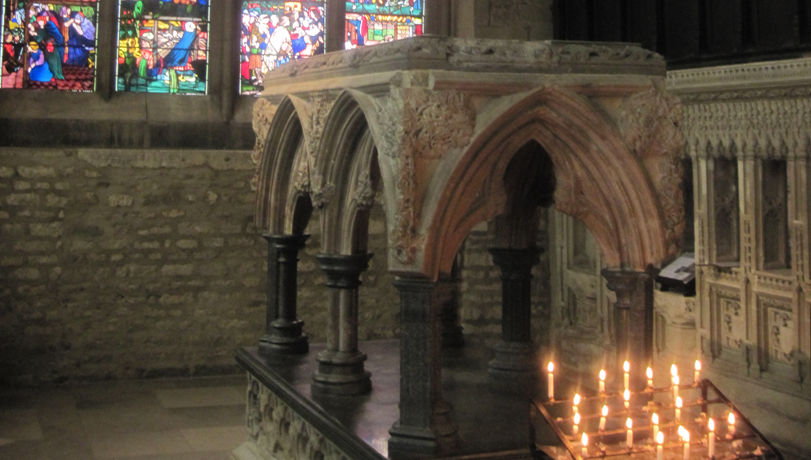 |
| Bardsey Island where St. Dyfrid retired, North Wales. "The island of one thousand saints." |
St. Dyfrig was a monk and bishop of sixth century Wales. Raised a Christian he established abbeys at Hentland, where the parish church is dedicated to him, and Moccas, both in Herefordshire, which became renowned centers of Welsh Christian learning and produced many more saints. He acted as a missionary bishop to parts of Herefordshire and southern Wales and eventually became the Archbishop of Caerleon, Primate of the ancient Welsh Church. As Archbishop he fostered the Welsh monasticism to which he was so accustomed on a much larger scale establishing more abbeys and churches with the help of his friend, the Abbot St. Illtud and St. Cadog the hermit, and consecrating some of Wales' most important saints bishops, including St. Samson and St. Deiniol. In 545, he is said to have called a synod Llandewi Brefi for the Church to uniformly reject the Pelagian heresy, which suggests his possible association with St. Germanus of Auxerre. It was at this synod that Dyfrig passed the Archbishopric of Caerleon to St. David of Wales, and retired to Bardsey, the Island of Saints, where he died at the famous monastery. His relics were translated in the 12th century to the Cathedral at Llandaff, where they still rest. Though St. David is dully remembered as the great saint of the Welsh people, Dyfrig was key to the stability of the Welsh Church. Monasteries would remain the core of Celtic Christianity for centuries to come and Dyfrid greatly contributed to their establishment in Wales, securing the strength and ability of the Christian religion in a tumultuous time period with no end in sight. Dyfrig, although not the founder of Christianity in Wales should be considered one of its greatest fathers, and thus one of the fathers of Christianity in Britain and of the whole Anglican Church.
The time period in which Dyfrig lived is dark with uncertainty. But what we do know about Dyfrig and his passionate nurturing of the faith is precious to our Church's history and modern life when she looks back to her roots to see who watered the seedling that became the tree. Although Dyfrig may seem, then, like an obscure, eclipsed figure, our Church is directly descended from his work and only through the revival of his work can the Church continue the mission established by Our Savior and nurtured by St. Dyfrig 1460 years ago. There are many saints like Dyfrig, whose lives are partly missing to us in the fog of time but who's examples and works passed the Church to us so that we, though we too may someday be obscured in the same fog, can pass on the same beloved faith for generations 1460 years from now.
 |
| Llandaff Cathedral, established by St. Dyfrig. |



No comments:
Post a Comment